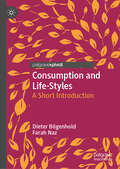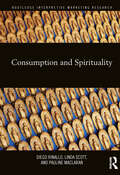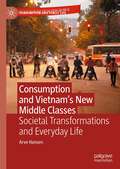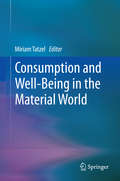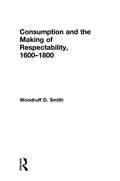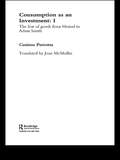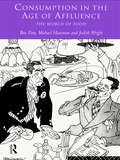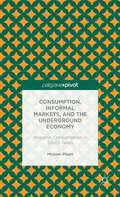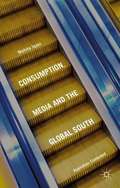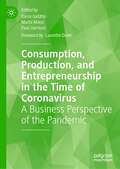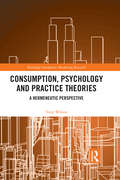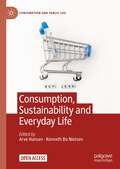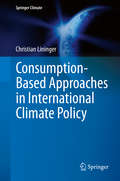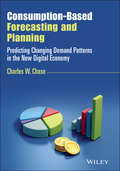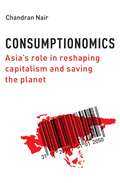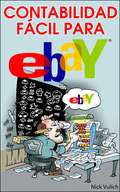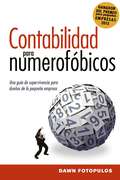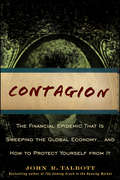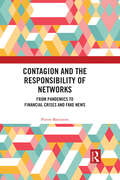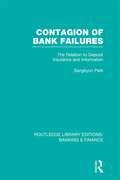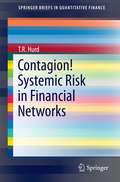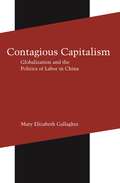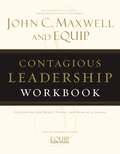- Table View
- List View
Consumption and Life-Styles: A Short Introduction
by Dieter Bögenhold Farah NazThis book takes an interdisciplinary approach to the world of consumption, covering different topics and including sociological, economic and marketing aspects. The term ‘consumption’ is vague and even in academic disciplines the term is used in a variety of ways. Consumption research asks how earnings and spending are related to each other. More generally, consumption research investigates how people, social classes or societies realize their consumption practices. The question of how consistent preference structures are due to changing empirical backgrounds of time, space and related culture is frequently asked. Which context variables (historical time, geographical framework, cultural background) specify the practice of consumption and in which way do attributes such as age, gender, class, occupation and life-style have their own impacts on the way in which consumption is realised?This book will be of interest to researchers working in economics, sociology, marketing, aesthetics and design, anthropology and communication studies.
Consumption and Spirituality (Routledge Interpretive Marketing Research)
by Linda Scott Pauline Maclaran Diego RinalloThis book sheds light on the consumption of spiritual products, services, experiences, and places through state-of-the-art studies by leading and emerging scholars in interpretive consumer research, marketing, sociology, anthropology, cultural, and religious studies. The collection brings together fresh views and scholarship on a cultural tension that is at the centre of the lives of countless individuals living in postmodern societies: the relationship between the material and the spiritual, the sacred and the profane. The book examines how a variety of agents – religious institutions, spiritual leaders, marketers and consumers – interact and co-create spiritual meanings in a post-disenchanted society that has been defined as a ‘supermarket of the soul.’ Consumption and Spirituality examines not only religious organizations, but also brands and marketers and the way they infuse their products, services and experiences with spiritual meanings that flow freely in the circuit of culture and can be appropriated by consumers even without purchase acts. From a consumer perspective, the book investigates how spiritual beliefs, practices, and experiences are now embedded into a global consumer culture. Rather than condemning consumption, the chapters in this book highlight consumers’ agency and the creative processes through which authentic spiritual meanings are co-created from a variety of sources, local and global, and sacred and profane alike.
Consumption and Vietnam’s New Middle Classes: Societal Transformations and Everyday Life (Consumption and Public Life)
by Arve HansenThis book studies the dramatic changes in consumption patterns in Vietnam over the past decades, combining a focus on everyday practices and societal transformations. Zooming in on the new urban middle classes, and through in-depth case studies in the realms of mobility, food and energy, the book brings new insights to some of the most urgent global sustainability challenges. Based on a decade of research in Vietnam, the book aims to contribute to better understanding one of the most fascinating ‘development success stories’ in the world. It introduces the term ‘consumer socialism’ to analyse some of the contradictions embedded in the socialist market economy. Simultaneously, the book aims to contribute to strengthening consumption research in and on emerging economies, and for this purpose develops a theoretical approach focusing on social practices and the political economy of consumption.
Consumption and Well-Being in the Material World
by Miriam TatzelThis volume addresses how we can find happiness and well-being in the material world. It builds on previous works that find that materialism is associated with lowered well-being (materialists are less happy) and that consumerism, in all its profusion, is harmful to environmental well-being. How can we use the money and possessions in our lives in the service of well-being? Apparently not by being materialistic. Can we benefit from the many wonders of the marketplace -- in technology, convenience and aesthetics -- without falling prey to the lures and dangers of excessive material preoccupation? Can we meet our material needs in ways that nourish growth and well-being? The authors of the chapters in this volume are on-going researchers into such questions. Herein you can learn about the hedonic benefits of thrift and of spending on experiences; how possessions can be beneficial; how different types of consumers spend money; cultural variations in conceptions of the "good life;" how we might reconcile environmental and consumer well-being; and how to measure the whole of human, economic, and environmental well-being. Taken all together, this collection finds grounds for compatibility between what's good for the consumer and what's good for the environment. This volume appeals to academics, professionals, students and others interested in materialism and consumer well-being.
Consumption and the Making of Respectability, 1600-1800
by Woodruff SmithTying together of several distinct cultural patterns during this century to create a culture of respectability and its impact on popular culture, trade, politics, social dynamics, and literature, this original and thoughtful work provides a comprehensive and much-needed understanding of the origins of modern consumption and all of its cultural impl
Consumption as an Investment (Routledge Studies In The History Of Economics #Vol. 71)
by Cosimo PerrottaPerrotta explores and charts the changing place of consumption as a source of investment in production and growth within economic writings from ancient history to the present. This ambitious project is carried out with great skill, vigour and originality and will help to bring consumption studies into the mainstream of economic thought.
Consumption in the Age of Affluence: The World of Food
by Judith Wright Ben Fine Michael HeasmanWith growing affluence in the developed world, food has become an increasing focus for attention. Here, the authors argue that in order to understand the extensive and dramatic developments in the world of food, a new interdisciplinary approach is necessary. The Age of Affluence successfully addresses food consumption in this way. The volume: * argues the importance of socioeconomic and cultural factors over diet, in influencing the production, marketing and consumption of different groups of foods; * places food systems theory on sound analytical foundations; * draws critically upon food systems literature; * includes case studies from the sugar, dairy and meat systems; * employs novel statistical techniques to identify and explain distinct patterns of food consumption; The book will help to revitalize the discipline of food studies and points the way forward for the continuing study of food consumption. As such, it will be invaluable to students, researchers and policymakers engaged in the world of food.
Consumption, Informal Markets, and the Underground Economy: Hispanic Consumption in South Texas (Palgrave Pivot)
by Michael J. PisaniUsing original qualitative ethnographic field interviews and quantitative field survey results, Consumption, Informal Markets, and the Underground Economy explores the rationale for and model of 'off the books' consumption in a borderlands environment.
Consumption, Media and the Global South: Aspiration Contested
by Mehita IqaniWhat does consumption in the global south signify, and how are its complexities communicated in media discourses? This book looks at the media representation of consumer culture in Africa, China, Brazil and India through case studies ranging from celebrity selfies, to travel websites, news reports and documentary film.
Consumption, Production, and Entrepreneurship in the Time of Coronavirus: A Business Perspective of the Pandemic
by Paul Harrison Marta Massi Elena GallittoThis book examines the impact of the continuing COVID-19 crisis on consumers and businesses. With stay-at-home orders and social distancing measures mandated by governments worldwide, businesses have made significant adjustments to adapt to the sudden changes caused by the pandemic. The book aims to understand what settling and thriving in the “new normal” have meant for businesses around the world. This book is divided into sections on production, consumption, and entrepreneurship and explores how consumer psychology has changed while also evaluating new digital business opportunities afforded by the pandemic. By bringing together psychology and marketing scholars, this interdisciplinary book will inform research on how businesses adapt to crises.
Consumption, Psychology and Practice Theories: A Hermeneutic Perspective (Routledge Interpretive Marketing Research)
by Tony WilsonPractice theories of our equipped and situated tacit construction of participatory narrative meaning are evident in multiple disciplines from architectural to communication study, consumer, marketing and media research, organisational, psychological and social insight. Their hermeneutic focus is on customarily little reflected upon, recurrent but required, practices of embodied, habituated knowing how—from choosing ‘flaw-free’ fruit in a market to celebrating Chinese New Year Reunion Dining, caring for patients to social media ‘voice’. In ready-to-hand practices, we attend to the purpose and not to the process, to the goal rather than its generating. Yet familiar practices both presume and put in place fundamental understanding. Listening to Asian and Western consumers reflecting—not only subsequent to but also within practices—this book considers activity emplacing core perceptions from a liminal moment in a massive mall to health psychology research. Institutions configure practices-in-practices cohering or conflicting within their material horizons and space accessible to social analysis. Practices theory construes routine as minimally self-monitored, nonetheless considering it as being embodied narrative. In research output, such generic ‘storied’ activity is seen as (in)formed, shaped from a shifting hierarchy of ‘horizons’ or perspectives—from habituated to reflective—rather than a single seamless unfolding. Taking a communication practices route disentangles and avoids conflating tacit and transformative construction of identities in qualitative research. Practices research crosses discipline. Ubiquitous media use by managers and visitors throughout a shopping mall responds to investigating not only with digital tracking expertise but also from an interpretive marketing viewpoint. Visiting a practice perspective’s hermeneutic underwriting, spatio-temporal metaphorical concepts become available and appropriate to the analysis of communication as a process across disciplines. In repeated practices, ‘horizons of understanding’ are solidified. Emphasising our understanding of a material environment as ‘equipment’, practices theory enables correlation of use and demographic variable in quantitative study extending interpretive behavioural and haptic qualitative research. Consumption, Psychology and Practice Theories: A Hermeneutic Perspective addresses academics and researchers in communication studies, marketing, psychology and social theory, as well as university methodology courses, recognising philosophy guides a discipline’s investigative insight.
Consumption, Sustainability and Everyday Life (Consumption and Public Life)
by Kenneth Bo Nielsen Arve HansenThis open access book seeks to understand why we consume as we do, how consumption changes, and why we keep consuming more and more, despite the visible damage we are doing to the planet. The chapters cover both the stubbornness of unsustainable consumption patterns in affluent societies and the drivers of rapidly increasing consumption in emerging economies. They focus on consumption patterns with the largest environmental footprints, including energy, housing, and mobility and engage in sophisticated ways with the theoretical frontiers of the field of consumption research, in particular on the ‘practice turn’ that has come to dominate the field in recent decades. This book maps out what we know about consumption, questions what we take for granted, and points us in new directions for better understanding—and changing—unsustainable consumption patterns.
Consumption-Based Approaches in International Climate Policy (Springer Climate)
by Christian LiningerThis book analyses the potentials and consequences of a change from production-based to consumption-based approaches in international climate policy. With the help of an analytical model, the author investigates the effects of different policy variants on environmental effectiveness, cost-effectiveness, carbon leakage, competitiveness and the global distribution of income. The economic, legal and political background and the often contradictory findings on consumption-based approaches are reviewed in great detail. In the final chapters, options for practical policy design are developed. The book concludes that a switch to consumption orientation is not a policy tool whereby industrialized countries can unilaterally improve climate policy effectiveness, but should rather be seen as a possible intermediate step on the way to a fully multilateral mitigation strategy.
Consumption-Based Forecasting and Planning: Predicting Changing Demand Patterns in the New Digital Economy (Wiley and SAS Business Series)
by Charles W. ChaseDiscover a new, demand-centric framework for forecasting and demand planning In Consumption-Based Forecasting and Planning, thought leader and forecasting expert Charles W. Chase delivers a practical and novel approach to retail and consumer goods companies demand planning process. The author demonstrates why a demand-centric approach relying on point-of-sale and syndicated scanner data is necessary for success in the new digital economy. The book showcases short- and mid-term demand sensing and focuses on disruptions to the marketplace caused by the digital economy and COVID-19. You’ll also learn: How to improve demand forecasting and planning accuracy, reduce inventory costs, and minimize waste and stock-outs What is driving shifting consumer demand patterns, including factors like price, promotions, in-store merchandising, and unplanned and unexpected events How to apply analytics and machine learning to your forecasting challenges using proven approaches and tactics described throughout the book via several case studies. Perfect for executives, directors, and managers at retailers, consumer products companies, and other manufacturers, Consumption-Based Forecasting and Planning will also earn a place in the libraries of sales, marketing, supply chain, and finance professionals seeking to sharpen their understanding of how to predict future consumer demand.
Consumption: The Happiness of Pursuit--The Implications for Marketing and Politics
by John A. Quelch Katherine A. JoczWhile consumption is an individual, private act, it affects the national wealth and international trade. Underconsumption depresses the economy, and overconsumption can produce financial distress for individuals, or overuse and damage of natural resources and the environment. In this way, consumption becomes a matter of political debate. In the democracy of the marketplace, consumers may increasingly choose to consume those products and services they consider to be healthy and environmentally sound or otherwise socially valuable. In this chapter, the authors reflect on the entanglements between consumption, marketing, and politics.
Consumptionomics: Asia's Role in Reshaping Capitalism and Saving the Planet
by Chandran Nair"The current crisis is over money tends to obscure bigger crises over the whole direction of out society. Chandran Nair well brings out the need for us to think again: about our consumption of diminishing resources, the way we measure economic wealth and social health, the changing balance of power between East and West, and the damage we are doing to the natural environment - in short, the future of human society in a vulnerable world. Most important he points to a better way ahead. " - Sir Crispin Tickell "Two virtually certain major trends will create a massive global collision. First, Asian living standards will rise spectacularly. This is good. Second, Asians will replicate Western consuming patterns. This is bad. How do we gain the good and avoid the bad? This will be one of the biggest questions of the twenty-first century. Chandran Nair's book could not be timelier. We need to seriously address the major questions that he raises and heed his valuable advice. " - Kishore Mahbubani, former Singapore Ambassador to UN and author of "Can Asians Think? And The New Asian Hemisphere: The Irresistible Shift of Global Power to the East" "Reconciling the needs of billions of new consumers with the requirements of a planet that is already showing the strains of ecological carelessness, overexploitation and unsustainable pollution, is one of the urgent challenges facing humanity. "Consumptionomics" shows what it will take to rise to this challenge and what the consequences of failing to do so would be, while also offering ideas about what to do. A fascinating read about an indispensable debate. " - Moises Naim, former editor of "Foreign Policy" magazine and author of "Illicit: How Smugglers, Traffickers and Copycats are Hijacking the Global Economy" "Terrifying, but terrific "Consumptionomics" is an outstanding analysis of what the rise of Asia means for our world. Chandran makes an incredibly compelling argument about why business (i. e. consumption) as usual just won't do. Rather than acting as an impediment to growth for the region, addressing this issue head-on becomes an opportunity to innovate and shift towards a low-carbon economy, growing even more, faster and better. " - Jose-Maria Figueres, former president of Costa Rica, and former MD of the World Economic Forum
Contabilidad Fácil Para Ebay
by Carlos Blanco Nick Vulich¿Serio acerca de su negocio en el Internet? Contabilidad Fácil para eBay es un iniciador financiero para los vendedores en el Internet. Lo ayudará a domar la bestia, para que Ud. pueda dejar de hacer malabares con sus recibos, los formularios de impuestos y el miedo a una auditoría del Servicio de Rentas Internas. El libro es como una Maestría en Administración de Empresas presentada en cortos y simples bytes. > He aquí una muestra de lo que Ud. aprenderá. > Eliminaremos el misterio de la contabilidad > Le daremos los términos básicos de negocio que Ud. necesita saber > Le ayudaremos a domar el monstruo que es GoDaddy Bookkeeping > Le ayudaremos a maniobrar en el laberinto de los impuestos, las licencias de negocio y las deducciones de negocio más comunes. Si UD. se ha preguntado alguna vez si puede tomar la deducción por usar su casa para negocios , reclamar los gastos por kilometraje por usar su carro para negocios; consideró deducir una nueva computadora, iPad o iPhone; o pensó acerca de deducir sus próximas vacaciones como un viaje de negocios. ¡No se preocupe! Se lo explicaremos todo. Y si vende en múltiples plataformas, también lo ayudaremos. Contabilidad Fácil para eBay aplica a vendedores de Amazon y de Etsy también. Recoja su copia hoy y aprenda como hacer crecer su negocio - ¡Un número detrás otro!:
Contabilidad para numerofóbicos: Una guía de supervivencia para propietarios de pequeñas empresas
by Dawn Fotopulos¿Por qué tantos empresarios temen analizar las finanzas? Ponen excusas... no tienen tiempo... eso es responsabilidad del contador... pero la verdad es que nadie está tan interesado en su empresa como ellos mismos, y necesitan tomar el control.Como propietario de una pequeña empresa, los estados financieros son sus herramientas más importantes y si no saben leer y comprender sus implicaciones, no puede dirigir su negocio exitosamente. Este libro desmitifica las operaciones financieras de su compañía: la declaración neta de ingresos, la declaración de flujo de efectivo y balances. Explica en lenguaje sencillo cómo cada medida refleja el estado general de su compañía e impacta sus decisiones. Usted descubrirá:Cómo su declaración neta de ingresos es la clave para incrementar sus ganancias.Cómo identificar el punto de equilibrio en el cual su empresa es autosostenible.Consejos reales sobre cómo medir y aumentar el flujo de efectivo.Qué revelan las hojas de balance sobre el valor de su empresa.Y másIlustrado con estudio de casos y lleno de pasos prácticos para la acción, esta guía esencial pondrá su negocio en el camino de la rentabilidad de inmediato.
Contagion
by John R. TalbottBestselling author John Talbott outlines the troublesome economic times ahead and what can be done about themTough times are here, and author John Talbott-who accurately predicted the dot.com technology stock collapse as well as the recent housing, mortgage, and financial crises-argues that the coming global recession will be unlike anything we've ever seen.In Contagion, Talbott turns his attention to this crisis and offers insights on what can be done to navigate such treacherous terrain. Talbott sets the stage by discussing how government borrowing and spending on the war, healthcare, Social Security, and corporate giveaways combined with dramatic increases in personal spending, fueled by credit card and mortgage debt, have funded unsustainable levels of personal and government consumption.Offers practical suggestions as to how investors and homeowners can best weather this storm with straightforward advice on where to investExamines real estate and housing issues to help you make the best decisions possible in this arenaDetails the best ways to utilize stocks, bonds, TIPS, and commodities, and to prosper during this global crisisIf you really want to protect yourself from the unfolding economic crisis, then Contagion is the book you need to read.
Contagion and the Responsibility of Networks: From Pandemics to Financial Crises and Fake News
by Pietro Battiston‘Contagion’ is a crucial term in the theory of networks, that is nowadays employed to study increasingly diverse issues such as financial crises, epidemics, and fake news. It provides a unifying framework to describe various social and economic phenomena that occur within different networks — involving various forms of contagion.This book discusses contagion over social and economic networks, and its consequences for modern societies. It starts with an accessible but solid introduction to basic concepts of the theory of networks, with intuitive explanations and examples both of networks that shape our daily lives, and of how researchers analyze them. It then focuses specifically on contagion, and on its importance for societies. Three crucial examples are analyzed more in depth: epidemiological contagion, fake news and financial crises. The conclusions show how various societal problems — each consequence of some form of contagion — call for similar policy measures: a pre-emptive and comprehensive effort in collecting the required information, and a shift in the concept of individual responsibility itself.This is a book for any reader who is interested in how contagion and networks shape modern society.
Contagion of Bank Failures: The Relation to Deposit Insurance and Information (Routledge Library Editions: Banking & Finance)
by Sangkyun ParkThis volume examines the vulnerability of sound banks during financial crises helps understand the nature of financial crises and other banking issues traces the history of banking reform in the United States from 1933 until 1992 discusses deregulation in the US banking system
Contagion! Systemic Risk in Financial Networks
by T. R. HurdThis volume presents a unified mathematical framework for the transmission channels for damaging shocks that can lead to instability in financial systems. As the title suggests, financial contagion is analogous to the spread of disease, and damaging financial crises may be better understood by bringing to bear ideas from studying other complex systems in our world. After considering how people have viewed financial crises and systemic risk in the past, it delves into the mechanics of the interactions between banking counterparties. It finds a common mathematical structure for types of crises that proceed through cascade mappings that approach a cascade equilibrium. Later chapters follow this theme, starting from the underlying random skeleton graph, developing into the theory of bootstrap percolation, ultimately leading to techniques that can determine the large scale nature of contagious financial cascades.
Contagious Capitalism: Globalization and the Politics of Labor in China
by Mary Elizabeth GallagherOne of the core assumptions of recent American foreign policy is that China's post-1978 policy of "reform and openness" will lead to political liberalization. This book challenges that assumption and the general relationship between economic liberalization and democratization. Moreover, it analyzes the effect of foreign direct investment (FDI) liberalization on Chinese labor politics. Market reforms and increased integration with the global economy have brought about unprecedented economic growth and social change in China during the last quarter of a century. Contagious Capitalism contends that FDI liberalization played several roles in the process of China's reforms. First, it placed competitive pressure on the state sector to produce more efficiently, thus necessitating new labor practices. Second, it allowed difficult and politically sensitive labor reforms to be extended to other parts of the economy. Third, it caused a reformulation of one of the key ideological debates of reforming socialism: the relative importance of public industry. China's growing integration with the global economy through FDI led to a new focus of debate--away from the public vs. private industry dichotomy and toward a nationalist concern for the fate of Chinese industry. In comparing China with other Eastern European and Asian economies, two important considerations come into play, the book argues: China's pattern of ownership diversification and China's mode of integration into the global economy. This book relates these two factors to the success of economic change without political liberalization and addresses the way FDI liberalization has affected relations between workers and the ruling Communist Party. Its conclusion: reform and openness in this context resulted in a strengthened Chinese state, a weakened civil society (especially labor), and a delay in political liberalization.
Contagious Leadership Workbook: The EQUIP Leadership Series
by John C. MaxwellWhat does it mean to be a good leader? Do you believe that leadership is a biblical idea? Founded by John C. Maxwell in 1996, EQUIP™ is dedicated to equipping Christians with the leadership skills needed for advancing the Great Commission in their communities, workplaces, and churches. This curriculum, featuring Maxwell's core leadership teachings, has been translated into 35 languages and taught in over 100 countries, and has already effectively trained over one million leaders worldwide! According to Genesis 1:26, God made us to lead. Join leadership expert John C. Maxwell and EQUIP™ in an exploration of biblical leadership. In Contagious Leadership Workbook, you will learn how to grow as a leader-cultivate your people skills and deepen your relationships, learn to develop and communicate vision and purpose, discover how to set priorities and strengthen your time management skills, and how to become a good mentor. This material is perfect for you if: You want to develop your people by investing in them personally You want to grow your church You are busy and have little time to write your own leadership training curriculum You want high-quality, proven, field-tested material developed by veteran leaders You want to equip your leaders to excel in their ministries Designed for personal or group study, this workbook contains everything you need to train your leadership team and the entire church body or organization to be effective, biblical leaders. Learn the life-changing leadership principles that hundreds of thousands of people around the world have discovered. It has worked for them-it can work for you!
Contagious: How to Build Word of Mouth in the Digital Age
by Jonah BergerThe New York Times bestseller that explains why certain products and ideas become popular. &“Jonah Berger knows more about what makes information &‘go viral&’ than anyone in the world.&” —Daniel Gilbert, author of the bestseller Stumbling on Happiness What makes things popular? If you said advertising, think again. People don&’t listen to advertisements, they listen to their peers. But why do people talk about certain products and ideas more than others? Why are some stories and rumors more infectious? And what makes online content go viral? Wharton marketing professor Jonah Berger has spent the last decade answering these questions. He&’s studied why New York Times articles make the paper&’s own Most E-mailed list, why products get word of mouth, and how social influence shapes everything from the cars we buy to the clothes we wear to the names we give our children. In Contagious, Berger reveals the secret science behind word-of-mouth and social transmission. Discover how six basic principles drive all sorts of things to become contagious, from consumer products and policy initiatives to workplace rumors and YouTube videos. Learn how a luxury steakhouse found popularity through the lowly cheesesteak, why anti-drug commercials might have actually increased drug use, and why more than 200 million consumers shared a video about one of the most boring products there is: a blender.Contagious provides specific, actionable techniques for helping information spread—for designing messages, advertisements, and content that people will share. Whether you&’re a manager at a big company, a small business owner trying to boost awareness, a politician running for office, or a health official trying to get the word out, Contagious will show you how to make your product or idea catch on.
